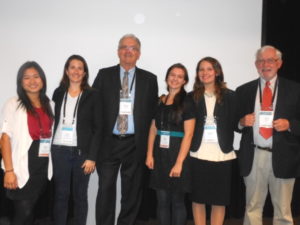
2014 Young Scholar: Amy Vos

Amy Vos
James Cook University
Sponsored by the Queensland Committee
Amy is studying a masters in Natural Resource Management at James Cook University. She completed a bachelor’s degree (Interdisciplinary Studies in Sustainability) at the Australian National University and is also doing a Graduate Diploma of Education to further develop her skills in science communication. She personally and academically very interested in food production, particularly aspects of sustainability and small-scale rural and urban agriculture. She is also interested in the intersections between social and natural sciences, and the impacts that human environmental use and management have on the natural environment. Amy is excited to be attending the conference as it spans many of her areas of interest – agriculture, community development, sustainability and food security.
Conference Report
I really value the opportunity to have been exposed to so many interesting and exciting ideas, some of which I already had an interest in and some of which were new to me.”
Attending the 2014 Crawford Fund conference was an extremely valuable experience for me. Speakers from Australia and around the world spoke with great knowledge and passion about wide-ranging aspects of food insecurity, the growing global population, and poverty. I really value the opportunity to have been exposed to so many interesting and exciting ideas, some of which I already had an interest in and some of which were new to me. As a scholar, I enjoyed meeting many other students, as well as researchers, industry professionals and government representatives.
For me, one highlight of the conference was the focus on the importance of considering women and their role when developing and implementing agricultural projects, particularly in the developing world. Professor Catherine Bertini was the first to raise the point in the Sir John Crawford Opening Address, and her message was clear: to increase agricultural productivity, we need to invest in women. The majority of population growth will be in developing nations, where women produce 60-80 percent of the food, but have much more restricted access to credit, technical assistance, and land rights. When women have adequate resources and food, their families are fed. When provided with equal inputs, women’s farms produce 20-30 percent more than men’s. In order to tackle the existing gender imbalance, Professor Bertini proposed a range of practical solutions, including a focus on extending basic education for all girls, encouraging girls to teach their mothers to read, provision of training and extension programs through available technologies such as radio (and at times appropriate to women), and consultation around and consideration of women’s needs when providing extension programs and resources. Professor Bertini memorably summed up her address by quoting Abigail Adams, “Don’t forget the ladies.” Throughout the conference, many other speakers reinforced and expanded on the point that working with women is key to increasing production and increasing food security.
My other main take-home message from the conference was the importance of nutrition: a theme that was key to the conference entitled ‘Feeding the 9 billion, well’. As someone with no background in nutrition, the focus on not just feeding but nourishing the world was eye opening. The ‘first 1000 days’ concept is very powerful, emphasizing the critical need for adequate sustenance from conception to two years old. Malnutrition through this period has ongoing and far-reaching impacts in terms of physical health, ability to pursue an education, subsequent earning power and the implications for escaping poverty. Focusing on improving nutritional status during this time, then, is a very effective way of achieving significant improvements to livelihoods.
The key themes of the conference were understanding the needs of people involved in agricultural production around the world, the importance of education and the provision of well-designed, targeted extension programs, and the importance of adequate nutrition, particularly for women and children, in breaking the poverty cycle, combatting hunger and improving food security.
